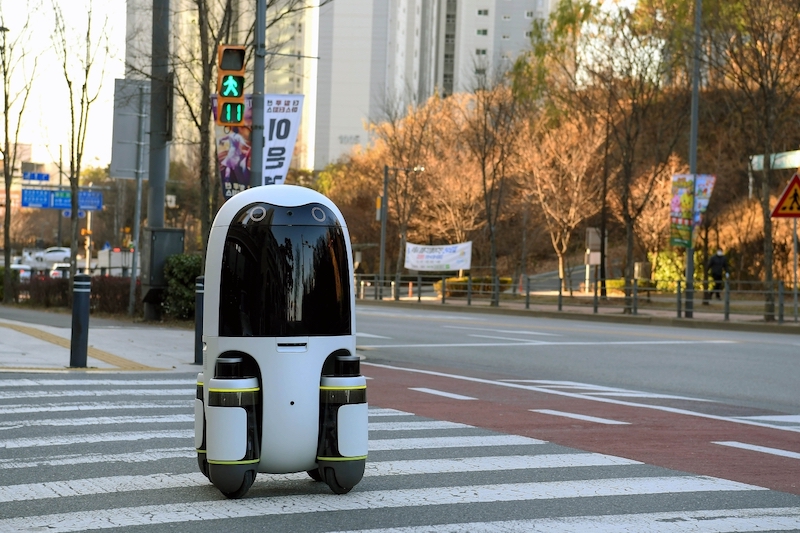Hyundai launches delivery robot pilot programs
Hyundai Motor Group has started two pilot delivery service programs using autonomous robots based on its “Plug & Drive” (PnD) modular platform at a hotel and a residential-commercial complex located in the outskirts of Seoul.
The delivery robot consists of a storage unit integrated on top of a PnD driving unit. Alongside the loading box used to deliver items, a connected screen displays information for customers.
First shown at CES 2022, Hyundai’s PnD modular platform is an all-in-one single wheel unit that combines intelligent steering, braking, in-wheel electric drive and suspension hardware, including a steering actuator for 360-degree, holonomic rotation.
It moves autonomously with the aid of LiDAR and camera sensors. An integrated storage unit allows the robot to transport products to customers.
By adding the autonomous driving capability, the PnD-based robot can find the optimal route within the area to deliver packages to recipients. It can recognise and avoid fixed and moving objects and drive smoothly, providing a fast delivery time.
Dong Jin Hyun, head of the robotics lab at Hyundai Motor Group, says: “PnD-based delivery robots allow quicker delivery times with improved safety through the use of autonomous driving technology, including fast obstacle avoidance capabilities.
“We plan to keep upgrading mobility services, convenience, safety and affordability for customers through our pilot programs.”
Rolling Hills Hotel, one of the businesses participating in the Hyundai’s pilot programs, is using the robot for room service from 8pm to 10pm daily, delivering amenities, food and drinks.
Hotel guests can place their room service orders using Kakao Talk, a popular messaging app, without installing any additional apps, and use real-time tracking to follow the delivery’s progress.
The robot in service at the hotel uses a deep learning-based algorithm to recognise the surrounding environment and people. When the robot arrives at the room it recognises the opening of the door, and once it perceives the recipient, it automatically opens the storage compartment for them.
The robot can communicate appropriate screen messages and in a befitting tone of voice based on the recipient. In addition, when moving between floors, the unit can determine the number of people boarding an elevator and wait for the next elevator if the first one is crowded.
The autonomous driving robot is also adept at avoiding obstacles and collisions, even in narrow hotel corridors, and can move between floors without human help due to electronic connectivity with the elevators, enabling it to deliver goods along an optimal route.
Hyundai has also partnered with Woowa Brothers, a Korean delivery company operating the Baemin food delivery app, since March 2021 to further advance the technology and service capabilities of last-mile outdoor delivery robots.
As part of a new program with Woowa Brothers, the Hyundai’s delivery robot is being used for door-to-door (D2D) food services at a residential/commercial complex in the outskirts of Seoul.
After a customer places an online order through Baemin, the robot finds the exact item at a shopping centre connected to a residential-commercial complex and delivers it to the customer’s front door.
To enable the service, Hyundai uses wireless communication to access communal front doors and elevators, an issue which was previously an obstacle to commercialising robot delivery service.
The service robot can enter the apartment complex, access upper floors through the elevator control system and deliver food to the customer’s home.
The technology enabling service robots to move autonomously indoors and outdoors and deliver food without human assistance has created a game-changing last-mile delivery innovation that is attracting significant attention from the logistics and retail industries. Hyundai expects last-mile delivery robots to greatly increase the efficiency of the entire delivery process.
Based on the results of these pilot programs, Hyundai plans to upgrade its PnD-based delivery robot services and gradually expand the number of robots and their operating hours. It also plans to expand its business into commercial areas that require delivery services to connect with customers.


